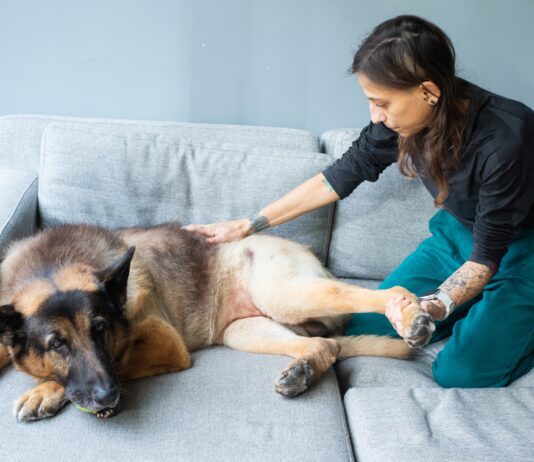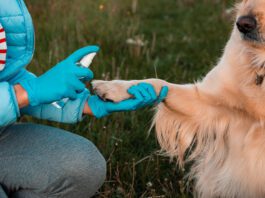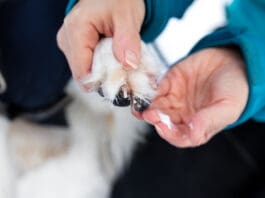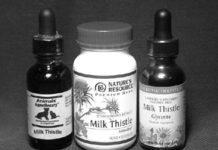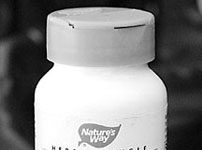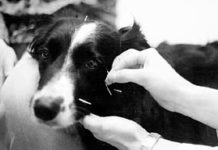Milk Thistle for Dogs
Milk thistle is an amazing herb, used to treat diabetes and IBD but its benefits to the liver are responsible for its inclusion in numerous medical research trials. Silymarin, which is itself a combination of several other active compounds, has been extensively studied around the world, and has been shown to be safe and effective in treating a variety of liver diseases and other conditions. It specifically protects the liver against toxins (including some drugs and heavy metals), activates protein synthesis, and stimulates growth of new liver cells to replace those that are dead or damaged. Milk thistle also has strong antioxidant (destroys oxygen free radicals) and anti-inflammatory actions.
Slippery Elm for Dogs: Safely Treat Irritation
Slippery elm (Ulmus fulva) is one of the safest herbs commonly given to dogs, and one of the most beneficial. Herbalists attribute many wonderful healing properties to slippery elm: demulcent (soothing, mucilage-forming), emollient (soothing and protective for skin), nutritive (providing specific nutrients), tonic (promoting healthy function of one or more body systems), and astringent (constricting, binding, or drying effect). It can be used both internally and externally. Slippery elm is one of the herbs used in the original formulation of Essiac
Eliminate Fleas Without Poisons
Today, spot-on flea products are advertised in every sort of media available to animal guardians and veterinarians, and are touted as safe and effective. However, the safety record of these products is not as spotless as the manufacturers would make us believe. After all, they contain pesticides, which are poisons, and they also contain toxic ingredients that are not disclosed to consumers or even veterinarians without applying through the Freedom of Information Act. The danger presented by these products is apparent in the hundreds of incident reports that sit in the Environmental Protection Agency's files not to mention the manufacturer's own animal laboratory studies.
Can Dogs Eat Garlic? Yes, in Small Quantities
One dictum for dealing with an ailing dog is to make sure he doesn’t get sick in the first place. And one way to achieve that noble end is to feed him a maintenance dose of garlic, a “wonder herb” that has a long list of beneficial effects for the dog in your life. Garlic has antiseptic, antibiotic, antifungal, and antimicrobial properties. It can be used as an anthelmintic (de-worming agent). It acts as a potent expectorant (helps bring phlegm or mucous up and out of the airway). It can lower blood pressure and prevent blood clots. And it can support the formation of good bacteria in the digestive tract.
Nursing Your Dog Back to Health Using a High-Quality Diet
The rescued puppy has diarrhea, gummy eyes, ear mites, and ringworm, but there’s a spark in his eye and his tail is wagging. A stray dog has an upper respiratory infection, skin lesions and worms, yet the person who finds her knows she’ll make a loyal companion. Some of the best dogs come into our lives in damaged condition, and the right support can transform them. Yet when dogs have multiple problems, it’s hard to know what to do first. Many dogs and puppies in pet stores, animal shelters, or on the street suffer from malnutrition and conditions that take advantage of impaired immunity; parasites, bacterial infections, fungi, and viruses all take their toll.
Canine Massage, Acupressure and TTouch
Who doesn't love petting a dog? The soft fur, the warm body and the animal's reciprocal affection makes stroking a dog a great pleasure for people. Petting is also good for dogs! Just as human infants can fail to thrive when deprived of affectionate contact, puppies who receive little or no contact from their handlers fail to develop as well physically or mentally as puppies who are petted and handled often. And even if their physical needs for warmth or food are provided, mature dogs can have a difficult time bonding with or responding to their human caretakers unless they receive consistent, affectionate physical contact.
Acupressure Techniques for Treating Dog Pain
More and more people, veterinarians included, are beginning to discover the benefits of these healing practices which have been used and trusted for over 4000 years. Acupressure, probably the oldest form of Chinese medicine, is the application of pressure, usually by the fingers, thumbs, and hands, to specific points on the body to stimulate the body’s own healing ability. Acupuncture, fully developed by 400 BC, uses needles that penetrate the skin to prompt the same acupoints on a deeper level.
Holistic Treatments for Osteosarcoma in Dogs
The date was Friday the 13th, so I guess I should have expected something unpleasant to happen, but the news from our family veterinarian that our 10-year-old Belgian Shepherd had, at the most about six months to live
Herbal Remedies for Common Canine Ailments
Good holistic health care fulfills the needs of the whole animal being, physically, mentally, and emotionally. A sound, well balanced diet (along with fresh, clean water), appropriate exercise, and proper behavioral education just about covers the bases. Or does it? Health is individual. Many people consider their animals to be healthy as long as they aren't sick, but to me, a healthy dog is happy and expressive, exuding resilience. Whether our animal companion denotes health with a gleaming eye, a flashing coat, and an athletic leap for a Frisbee, or a half cocked ear, sly grin, and thumping tail from the Barcalounger, we can best ascertain the level of our friends' health by observing over time what's normal for each unique individual.
Back Massage Techniques for Dogs
Most dogs are used to our touching them with randomly placed pats on the head or back. If you think about it, however, the primary result of this brief contact is communication. Petting your dog is one way we thank them for a job well done and convey our love or appreciation for them. Massage and other forms of touch are also ways to communicate with your dog, but in a very different manner than petting. When carried out consciously with quiet intention, the methods I will show you in this article will convey your affection AND communicate in a deep manner with the physical structures of the dog's body.
Homeopathy Sparks New Life
In September 1998, our female Bernese Mountain Dog, Annie, became lame with painfully swollen and inflamed joints that were noticeably warm to the touch. She was just over four years old at the time. The sudden initial onset of symptoms occurred about three weeks after her annual vaccinations and a three-year rabies vaccine. We took her to the vet, of course, who conducted tests and more tests. A thorough blood work-up showed unusual and elevated antibody levels. All tests for Lyme disease, lupus, and rheumatoid arthritis were negative.
Professional Animal Chiropractors
Chiropractic is one of the most effective, dramatic, and embattled health care modalities currently available to dog owners. The many amazed dog owners whose limping, stiff, sore dogs had to be lifted in and out of the car on the way to the chiropractor’s office, and who were surprised to see their dogs leap unaided into the car to return home after a chiropractic adjustment, can attest to the therapy’s effectiveness and drama. But, in trying to relate the story of their dog’s miraculous recovery at the hands of a chiropractor, many people learn how controversial the therapy is, especially to the uninitiated.


